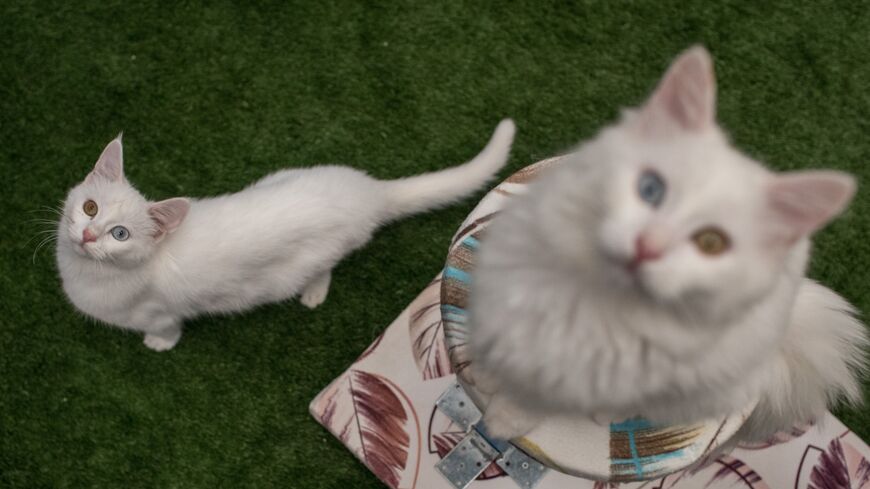Cat lovers in Turkey were uplifted by this week’s news that the country’s endangered Van species, hailing from the eponymous province bordering Iran, are multiplying in ever greater numbers.
Professor Abdullah Kaya, director of the Van Cat Research and Application Center at Van Yuzinci Yil University, said there was a significant increase in birthrates of the exotic breed that typically has snowy white fur and odd-colored eyes — one blue and the other amber. The first batch of kittens delivered this year at the Van Cat Villa, a breeding and research center in Van, numbered 65 compared with 35 for the same period last year, Kaya said.
Kaya attributed the boost in fertility to the quality of care and the constant improvement in genetic characteristics, according to the English-language newspaper Daily Sabah. “We believe that we are better every year compared to the previous [year],” Kaya asserted.
Van Kedisi Araştırma ve Uygulama Merkezi'nde, Van kedilerinin koruma altında oldukları Kedi Villası'nda yapımı tamamlanan havuzun sezon açılışı YYÜ Rektörü Hamdullah Şevli'nin katılımıyla yapıldı. pic.twitter.com/bTJrU9Bcbh
— Demirören Haber Ajansı (@dhainternet) May 10, 2019
The center opened its doors three decades ago with just a handful of the felines when the breed was on the brink of extinction. Until 2021, taking the cats out of the country was formally forbidden. Under the new regulations, owners need authorization from the Ministry of Agriculture before doing so.
The creation of a sperm bank facilitated selective breeding, and there are currently 300 Van cats at the Van Cat Villa, which is open to visitors every day. The cats are available for adoption. They can also be bought on the open market in Turkey. A breeder contacted by Al-Monitor today asked for 5,000 Turkish liras ($150) for a kitten.
Turks are huge cat lovers — a photo posted on Turkish President Recep Tayyip Erdogan’s personal Instagram account showing him stroking one of the felines clocked over half a million likes.
Local lore claims that the cats were part of Noah’s cargo and that they left the ark when the floodwaters receded and the vessel was left standing on the summit of Mount Ararat, Turkey’s tallest mountain that lies 321 kilometers (200 miles) northeast of Van. Another version has the cats hailing from an Egyptian strain that was brought to Van 3,000 years ago.
Unlike most cats, they enjoy swimming; hence, they are also known as “the swimming cat.” They have ample opportunity to indulge their hobby in Van, which is home to Turkey’s largest lake.
Cats.com advises owners, “If you want to make a Turkish Van cat happy, just leave a faucet running at a low dribble. Those mesmerizing drips will almost certainly keep them entertained.”
Celebrities seduced by the species include Andrew Lloyd Webber, the composer of the renowned musical, Cats.
This December, Andrew was thrilled to accept the role of honorary role of President of the Turkish Van Cat Club. Andrew currently has three Van Cats, Mika, Oddy and Fez! #TeamALW
— Andrew Lloyd Webber (@OfficialALW) December 12, 2018
Find out more about the society at: https://t.co/lEr7NSfJCc pic.twitter.com/Aqirjx1QDq
The breed is often likened to canines due to their unflinching loyalty to their owners and aversion to being left alone. They are usually gentle and child friendly. However, a 2021 study by Helsinki University ranked Van cats as the most aggressive among 26 breeds. Kaya called its conclusions "unacceptable” and suggested its authors were ignorant. “How many Van cats are there in Helsinki?” Kaya asked.



